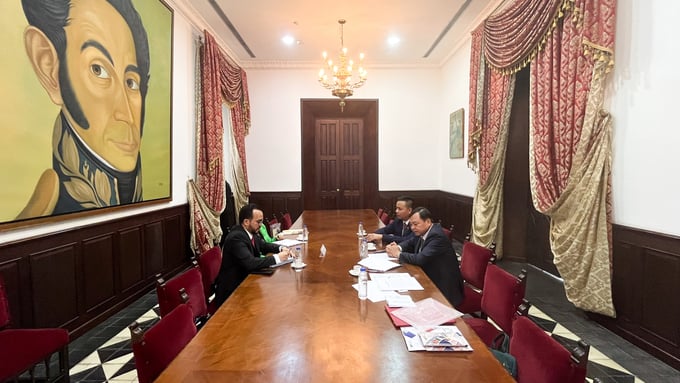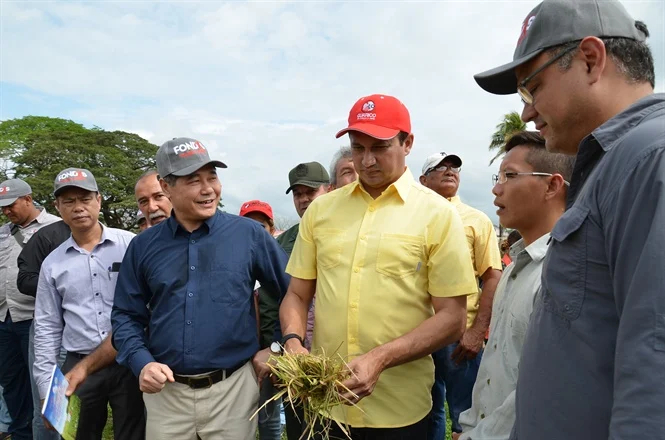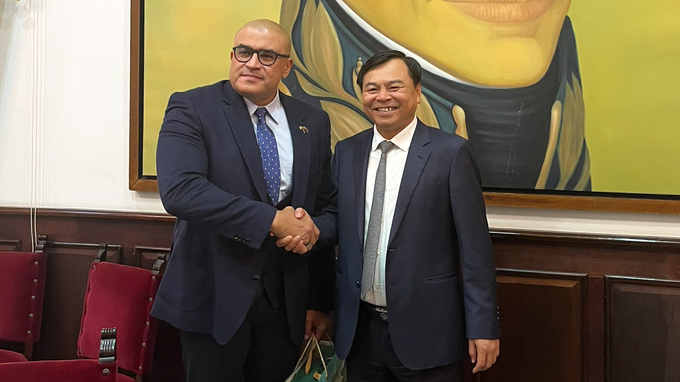December 10, 2025 | 17:56 GMT +7
December 10, 2025 | 17:56 GMT +7
Hotline: 0913.378.918
December 10, 2025 | 17:56 GMT +7
Hotline: 0913.378.918

Meeting between the Ministry of Agriculture and Rural Development and Venezuela's agricultural agencies on April 19.
On April 19 (local time), Deputy Minister of Agriculture and Rural Development Nguyen Hoang Hiep met with Venezuelan agencies responsible for agriculture and food security as part of Deputy Prime Minister Tran Luu Quang's official visit to Venezuela.
Vietnam and Venezuela officially established diplomatic relations on December 18, 1989, and have since developed a comprehensive partnership framework since May 2007. The year 2024 marks the 35th anniversary of the establishment of diplomatic relations between the two countries.
In economics, trade, and investment, the two nations have signed over 50 cooperation agreements across various sectors, implementing numerous bilateral cooperation mechanisms and projects, particularly in agriculture and aquaculture. Vietnam's agricultural endeavors in Venezuela have yielded positive results, including developing high-yield rice varieties, contributing significantly to Venezuela's food security.
Deputy Minister Nguyen Hoang Hiep emphasized, "The recent agricultural cooperation between Vietnam and Venezuela, particularly the rice production partnership in our country, can be viewed as a model for collaboration aimed at ensuring food security for Venezuela. Many countries worldwide are aware of this collaboration and have expressed interest in cooperating with Vietnam based on this model. Recently, Colombia, Venezuela's neighbor, has proposed cooperation on rice production in South America."
In December 2023, during the Hau Giang Rice Industry International Festival, the two countries signed a memorandum of understanding on agricultural development cooperation. Under this agreement, both parties committed to devising a plan and specifying detailed content for the continued implementation of the rice production cooperation project in Venezuela from 2024 to 2030. One of the focal points of this cooperation is the development of research activities, under the available budgetary conditions and the laws of both countries.
In particular, Venezuela has committed to exploring financial solutions to sustain the Rice Production Cooperation Project in the upcoming period.

Vietnam - Venezuela agricultural cooperation is considered a model for ensuring food security for Venezuela and the world.
During discussions with Deputy Minister Nguyen Hoang Hiep, a Ministry of Land and Agriculture representative stated, "Venezuela's economy is on an upward trajectory, maintaining robust growth, exceeding 5% in 2023. It can be affirmed that agriculture has emerged as one of the three key pillars of cooperation between the two countries today, alongside trade and telecommunications. Agricultural collaboration has exceeded expectations, even amidst Venezuela's challenging circumstances. It has wielded significant political and social influence in Venezuela, bolstering Vietnam's reputation and fostering trust between the two nations."
Venezuela acknowledges the agricultural assistance projects as "modest yet yielding tangible results." The representative of the Venezuelan Ministry of Agriculture emphasized that with the upcoming presidential election in November 2024, now is the opportune moment to continue advancing agricultural cooperation, thereby creating favorable conditions for collaboration in other economic sectors.
Since 2016, Vietnam has dispatched over 50 experts, technicians, workers, and interpreters to Venezuela to execute cooperation projects to develop rice and fisheries. These efforts have led to the testing of 20 Vietnamese rice varieties over three consecutive seasons, resulting in the selection of five varieties that thrive and flourish in Venezuelan conditions. These varieties boast a short growth period, are less susceptible to pests and diseases, and yield 1.5 to 2.5 times more than Venezuelan varieties. Notable among them are varieties such as VIVE25 (OM2517), VIVE50 (IR50404), VIVE80 (OM8017), VIVE95 (OM9582), and VIVE96 (OM9605).
Regarding establishing a plaice production model, Vietnamese experts have successfully devised a process for the artificial reproduction of plaice, even amidst adverse weather conditions and limited on-site facilities. Furthermore, Vietnamese experts have conducted fruitful research on commercial shrimp farming techniques and have imparted this knowledge to Venezuelan officials. Consequently, the farming cycle has been shortened from four to three months, resulting in a 30% reduction in food consumption—a development highly commended by the Venezuelan authorities. Based on these achievements, the two parties have jointly established a model for intensive white-legged shrimp farming, promising high productivity and quality.

The leaders of both Agriculture Ministries have concurred on the need to further bolster cooperation, leveraging both nations' potential and strengths.
Consequently, the leaders of both Agriculture Ministries have concurred on the need to further bolster cooperation, leveraging both nations' potential and strengths, with a particular emphasis on advancing the encouraging outcomes attained in recent endeavors. The Ministry of Agriculture and Rural Development proposes that Venezuela continues to expand and enhance the existing agricultural cooperation model while also taking a proactive stance in securing capital sources. Venezuela warmly welcomed this proposition and committed to exchanging information on policies, investment climates, liquidity measures, and other relevant factors to entice Vietnamese enterprises to explore opportunities in South America for investment, joint ventures, and mutually beneficial production and trade partnerships.
Translated by Quynh Chi

(VAN) According to Deputy Minister Nam, women are as capable as anyone when granted the opportunity to experiment and innovate.

(VAN) Dr. Fred Unger, former Regional Representative of ILRI in Asia, is honored as a pioneering expert who helped establish Viet Nam’s One Health and risk-based approaches in food safety.

(VAN) By joining the carbon market, Hoang Lien National Park can reinvest revenues into conservation and improving community livelihoods.

(VAN) Bach Ma National Park will continue to conserve biodiversity in ASEAN, aligned with sustainable agriculture and environmental development goals.

(VAN) Pu Mat National Park is a green gem of Nghe An province, and its value is further elevated after being officially recognized as an ASEAN Heritage Park.

(VAN) EU expects Viet Nam to seize the chance and comply with green standards to make strong breakthroughs in exporting high-quality agricultural products.

(VAN) These meaningful messages from international partners affirm VAN News' increasingly solid standing.